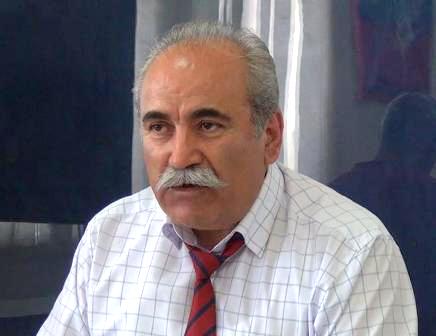 PALAIS DES NATIONS • 1211 GENEVA 10, SWITZERLAND
PALAIS DES NATIONS • 1211 GENEVA 10, SWITZERLAND
Mandates of the Working Group on Enforced or Involuntary Disappearances; the Special Rapporteur on the promotion and protection of the right to freedom of opinion and expression; and the Special Rapporteur on the promotion of truth, justice, reparation and guarantees of non-recurrence.
REFERENCE: AL TUR 1/2019, 25 March 2019
Excellency,
We have the honour to address you in our capacities as Working Group on Enforced or Involuntary Disappearances; Special Rapporteur on the promotion and protection of the right to freedom of opinion and expression; and Special Rapporteur on the promotion of truth, justice, reparation and guarantees of non-recurrence, pursuant to Human Rights Council resolutions 36/6, 34/18 and 36/7.
In this connection, we would like to bring to the attention of your Excellency’s Government information we have received alleging violations attributable to Turkey in relation to the tragic events that affected the Armenian minority from 1915 to 1923, and their consequences for the population concerned.
According to the information received:
From 1915 to 1923, the Ottoman Empire and its succeeding Turkish Republic implemented a policy of mass relocation of the Armenian minority living in the eastern part of the country. Hundreds of thousands (estimates range between 600,000 and 1,500,000) of persons belonging to that minority were subject to that policy, which resulted in widespread violence against that population.
Their forced deportation reportedly started in March 1915 mainly in Anatolia but also in other parts of the country. Armenians were expelled from their ancestral lands. On the night of 24th April 1915, hundreds of political and intellectual leaders were arrested in Constantinople and then transferred to other places. As a
result, Armenian elites disappeared almost completely. This was followed by a systematic policy targeting the entire Armenian population in each province and in each Vilayet, the official objective of which was to displace by force Armenian population from the eastern provinces of Anatolia to Aleppo and camps in the
Syrian desert. Armenians were subjected to forced marches. Most of them allegedly died progressively from exhaustion, starvation, diseases or from massacres, and in most cases their remains were abandoned. Upon arrival, the few surviving people were detained in camps in conditions which may have amounted to torture or cruel, inhuman or degrading treatment; most of them were subsequently killed. The process persisted through 1923.
It is alleged that these actions could constitute enforced disappearances to the extent that, (i) Armenians in Turkey were subjected to arrests, detentions, or abductions or were otherwise deprived of their liberty; (ii) these acts are reportedly attributable to officials or different branches or levels of government;
and (iii) the Government has not disclosed so far the fate or whereabouts of the persons concerned. It is also reported that Turkey not only refuses to acknowledge these events, but also intentionally engages in denial and obstruction of the truth about the fate or whereabouts of the victims.
Article 301 of Turkey’s Criminal Code prohibits any insult to the Turkish nation and its institutions1
, which has been reportedly used against persons for the mere fact of mentioning the alleged crimes against Armenians.
On 27 July 2017, Parliament approved a set of amendments to the Rules of Procedure of the Turkish Grand National Assembly, banning the use by lawmakers of expressions that may constitute “insult to the common past and history of the Turkish nation.” The debates on this draft show that the targeted expressions include qualification of the allegations and events that are the subject of this communication.
While we do not wish to prejudge the accuracy of these allegations, we wish to express our concern at the reported denial, and ensuing lack of progress in establishing the truth and ensuring justice for the forcible deportation of Armenians between 1915 and 1923, which resulted in massive suffering, ill-treatment and deaths. The lack of progress in establishing and acknowledging the relevant facts, not only affects the dignity of victims and their descendants, but can also hinder the possibility of initiating measures aimed at preserving the memory and establishing the truth. Furthermore, we express serious concern about the criminalization of expressions related to these events, under Article 301 of the Criminal Code and the legislation adopted in 2017. This legislation appears to constitute a deliberate effort to obstruct access to the truth about what appears to be policy of violence directed against the Turkish Armenian community at the time, and the right of victims to justice and reparation. The censorship of expression of opinion about historical facts by the legislative branch of government is of particular concern as it constrains or suppresses the space needed for research, fact-finding, documentation and discussion, for both historical purpose and law-making process within any democratic society. International human rights law prohibits the use of penal legislation to thwart such expression, regardless of whether the relevant opinions are correct or erroneous.
1
Article 301 (revised version of 29 April 2008) states that: “A person who publicly denigrates the Turkish Nation, the State of the Turkish Republic or the Grand National Assembly of Turkey shall be punishable by imprisonment from 6 months to 2 years. A person who publicly denigrates the military and police organizations of the State will too receive the same punishment. Expressions of thought intended to criticize shall not constitute a crime. The prosecution under this article will require the approval of the Minister of Justice.” The 2008 revision of Article 301 consisted in transforming the fact to denigrate “Turkishness” into the fact to denigrate “the Turkish Nation”, and to reduce the penalties and to require the authorization of the Minister of Justice before any institution of judicial proceedings against a person.
In connection with the above alleged facts and concerns, please refer to the Annex on Reference to international human rights law attached to this letter which cites international human rights instruments and standards relevant to these allegations.
As it is our responsibility, under the mandates provided to us by the Human Rights Council, to seek to clarify all cases brought to our attention, we would therefore be grateful for your observations on the following matters:
1. Please provide any information and/or comment(s) you may have on the allegations.
2. What policies have been put in place by your Excellency’s Government to respond to these allegations?
3. What measures has Turkey taken to establish the facts, including the fate or whereabouts of Armenians who were subjected to forced internal displacement, detention, extrajudicial killings and enforced disappearances during the period of 1915-1923?
4. What measures have been taken to ensure the right of victims and of society as a whole to know the truth about these events, and to ensure the right of victims to justice and reparations for the damage suffered?
5. What measures have been taken to locate, insofar as possible, the bodies of Armenians who died as a result of these events?
6. Please provide information about the reasons for the adoption of the 2017 legislation preventing lawmakers from making certain expressions. Please explain how this is compatible with international human rights law, in particular with article 19 of the International Covenant on Civil and Political Rights.
7. Please provide detailed information about the cases in which Article 301 of the Criminal Code has been applied to punish individuals for statements made alleging crimes against Armenians.
We would appreciate receiving a response within 60 days. Passed this delay, this communication and any response received from your Excellency’s Government will be made public via the communications reporting website. They will also subsequently be made available in the usual report to be presented to the Human Rights Council.
Please accept, Excellency, the assurances of our highest consideration.
Bernard Duhaime – Chair-Rapporteur of the Working Group on Enforced or Involuntary Disappearance
David Kaye – Special Rapporteur on the promotion and protection of the right to freedom of opinion
and expression
Fabian Salvioli – Special Rapporteur on the promotion of truth, justice, reparation and guarantees of nonrecurrence
Annex Reference to international human rights law
In connection with above alleged facts and concerns, we would like to draw the attention of your Excellency’s Government to the relevant international norms and standards that are applicable to the issues brought forth by the situation described above.
Principle 2 of the updated Set of Principles for the Protection and Promotion of Human Rights through Action to Combat Impunity establishes the inalienable right of all persons to know the truth about past events concerning the perpetration of heinous crimes and about the circumstances and reasons that led to them. Full and effective exercise of the right to the truth provides a vital safeguard against the recurrence of violations.
Principle 4 stipulates that victims and their families have the imprescriptible right to know the truth about the circumstances in which violations took place and about the victims’ fate. In addition, principle 5 imposes the obligation on States to take appropriate action, including measures necessary to ensure the independent and effective operation of the judiciary, to give effect to the right to know.
In its General Comment on the Right to Truth in Relation to Enforced Disappearances, the Working Group on Enforced or Involuntary Disappearances pointed out the “existence of the right to truth as an autonomous right.” This right is “both a collective and an individual right.” According to this right, “[e]ach victim has the right to know the truth about violations that affected him or her, but the truth also has to be told at the level of society as a ‘vital safeguard against the recurrence of violations’ (….). ”The Working Group observed that the right to know the truth “is an absolute right, not subject to any limitation or derogation”.
We would also like to refer to the obligation to investigate and punish human rights violations and to combat impunity for such crimes. In this regard, we would like to recall that, as established by the Human Rights Committee in its General Comment No. 31 (paragraph 18) States have an obligation to investigate and punish serious human rights violations, including summary or arbitrary killings, torture and other cruel,
inhuman or degrading treatment, and enforced disappearances. Failure to investigate and prosecute such violations is in itself a breach of the norms of human rights treaties.
Impunity for such violations can be an important element contributing to the recurrence
of violations.
We would also like to recall that Human Rights Council resolution 12/11 on Human rights and transitional justice reaffirms the responsibility of States to prosecute those responsible for gross violations of human rights and serious violations of international humanitarian law constituting crimes under international law, with a view to ending impunity (paragraph 7).
In addition, we would also like to draw your attention to the Basic Principles and Guidelines on the Right to a Remedy and Reparation for Victims of Gross Violations of International Human Rights Law and Serious Violations of International Humanitarian Law. Principles 10, 11 and 15 establish the right of victims to receive adequate, effective and prompt reparation for the harm suffered, and to have access to relevant information on reparation mechanisms.
We furthermore reiterate our call on your Excellency’s Government to take all necessary steps to secure the right to freedom of opinion and expression in accordance with fundamental principles as set forth in article 19 of the ICCPR, which provides that “Everyone shall have the right to freedom of expression; this right shall include freedom to seek, receive and impart information and ideas of all kinds, regardless of frontiers,
either orally, in writing or in print, in the form of art, or through any other media of his choice.” Restrictions on freedom of expression must be strictly limited and meet the high threshold set out in article 19(3) of the ICCPR. They must be provided by law, and be necessary to achieve a legitimate purpose, namely the protection of national security, public order, public health or morals. The restrictions must be proportional in the sense that they must be appropriate to achieve their protective function; and the restriction must
be provided by law.
In its General Comment No. 34 on Freedoms of opinion and expression (CCPR/C/GC/34), the Human Rights Committee stated that States parties to the ICCPR are required to guarantee the right to freedom of expression, including inter alia ‘political discourse, commentary on one’s own and on public affairs, canvassing, discussion of human rights, journalism’, subject only to admissible restrictions referred to above as well as the prohibition of propaganda for hatred and incitement to hatred, violence and discrimination.
In relation to restricting speech that is deemed ‘insulting to the nation’, we would like to highlight that under international human rights law, neither the nation nor the State is immune from criticism, even if it is deemed “insulting”. International human rights law protects individuals, and not States. In relation to public figures, the Human Rights Committee has indicated that the harassment, intimidation or stigmatization of a person, including arrest, detention, trial or imprisonment for reasons of the opinions they may hold and express, constitutes a violation of article 19. ‘Thus, the mere fact that forms of expression are considered to be insulting to a public figure is not sufficient to justify the imposition of penalties, albeit public figures may also benefit from the provisions of the Covenant. Moreover, all public figures, including those exercising the highest political authority such as heads of state and government, are legitimately subject to criticism and
political opposition (CCPR/C/GC/34).







